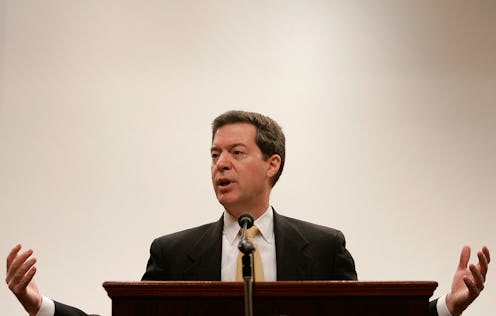News
Kansas May Expand Medicaid & Other States Should Too

It's been less than a week since President Trump and congressional Republicans failed to repeal and replace Obamacare, and one state has already responded in kind: The Kansas state Senate voted Monday to implement Obamacare's Medicaid expansion, bringing the state one step closer to providing health insurance to tens of thousands of uninsured people in the state. It's not a sure thing yet, as the state's Republican governor might veto the bill. Nevertheless, the fact is that Kansas might expand Medicaid and other states should follow suit.
The Medicaid expansion is one of the most powerful components in the Affordable Care Act. It allows anybody who makes up to 138 percent of the federal poverty level to enroll in the program, and to date, the expansion has provided health insurance to almost 9 million low-income Americans who didn't have it before. However, a 2012 Supreme Court ruling allowed states to opt out of the expansion if they so desired, and as of this writing, 19 states haven't expanded Medicaid.
So far, Kansas is such a state. Although Gov. Sam Brownback could have implemented the expansion himself, he didn't, instead signing a bill that requires legislative approval of the expansion before it takes effect. Well, on Monday, the expansion won that approval when the state Senate passed a bill implementing the expansion. That bill has already passed the state House, and it will soon land on Brownback's desk.
There are a few reasons why Brownback should sign it. Likewise, the other 18 states that haven't yet expanded Medicaid should do so immediately.
On the most basic level, states should expand Medicaid because doing so will give health insurance to people who can't afford it. And not just a few people: According to a study by the Kansas Health Institute, the Medicaid expansion would give health insurance to 80,000 Kansans who are currently uninsured. Studies have shown that Medicaid literally saves lives, and that alone is reason enough for states to implement the expansion.
But won't expanding Medicaid cost states an arm and a leg? Nope: Per Obamacare, the federal government pays for the entire cost of the expansion for the next three years, and then 90 percent of it after 2020. That's a fantastic deal, especially for cash-strapped states that otherwise wouldn't be able to afford such an expansion.
It's possible that Brownback will veto the expansion. He's been critical of expanding Medicaid in the past, and his office released a statement suggesting, although not outright stating, that he will veto it. If he does veto it, supporters of the expansion in the state legislature will have to scrounge up a couple of more votes in order to override the veto.
Though Brownback hasn't explicitly said whether or not he'll veto it, he previously signed a bill stating that the decision should be up to the legislature, not the governor. Thus, it would be flatly hypocritical of him to override state lawmakers now. It would also give the next Democratic gubernatorial candidate a winning campaign platform.
All of this, by the way, is a direct result of Trumpcare going down in flames, because that bill would have ended the Medicaid expansion. Thanks to that bill's failure, states now have the option of extending health care to tens of thousands of their residents for practically free. Now it's up to them to actually do it.